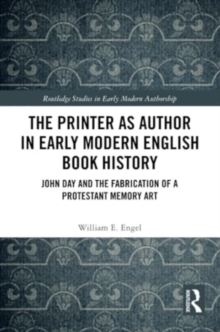Description
| Product ID: | 9781032223988 |
| Product Form: | Paperback / softback |
| Country of Manufacture: | GB |
| Series: | Routledge Studies in Early Modern Authorship |
| Title: | The Printer as Author in Early Modern English Book History |
| Subtitle: | John Day and the Fabrication of a Protestant Memory Art |
| Authors: | Author: William E. Engel |
| Page Count: | 232 |
| Subjects: | Literature: history and criticism, Literature: history & criticism, Literary theory, Literary studies: general, Literary studies: general, History, General and world history, History, Archaeology, Manufacturing industries, Literary theory, Literary studies: general, Literary studies: c 1500 to c 1800, History, General & world history, Early modern history: c 1450/1500 to c 1700, Archaeology, Manufacturing industries, Modern period, c 1500 onwards |
| Description: | Select Guide Rating This is the first book to demonstrate how mnemotechnical cultural commonplaces can be used to account for the look, style, and authorized content of some of the most influential books produced in early modern Britain. This is the first book to demonstrate how mnemotechnic cultural commonplaces can be used to account for the look, style, and authorized content of some of the most influential books produced in early modern Britain. In his hybrid role as stationer, publisher, entrepreneur, and author, John Day, master printer of England’s Reformation, produced the premier navigation handbook, state-approved catechism and metrical psalms, Book of Martyrs, England’s first printed emblem book, and Queen Elizabeth’s Prayer Book. By virtue of finely honed book trade skills, dogged commitment to evangelical nation-building, and astute business acumen (including going after those who infringed his privileges), Day mobilized the typographical imaginary to establish what amounts to—and still remains—a potent and viable Protestant Memory Art. |
| Imprint Name: | Routledge |
| Publisher Name: | Taylor & Francis Ltd |
| Country of Publication: | GB |
| Publishing Date: | 2024-01-29 |


